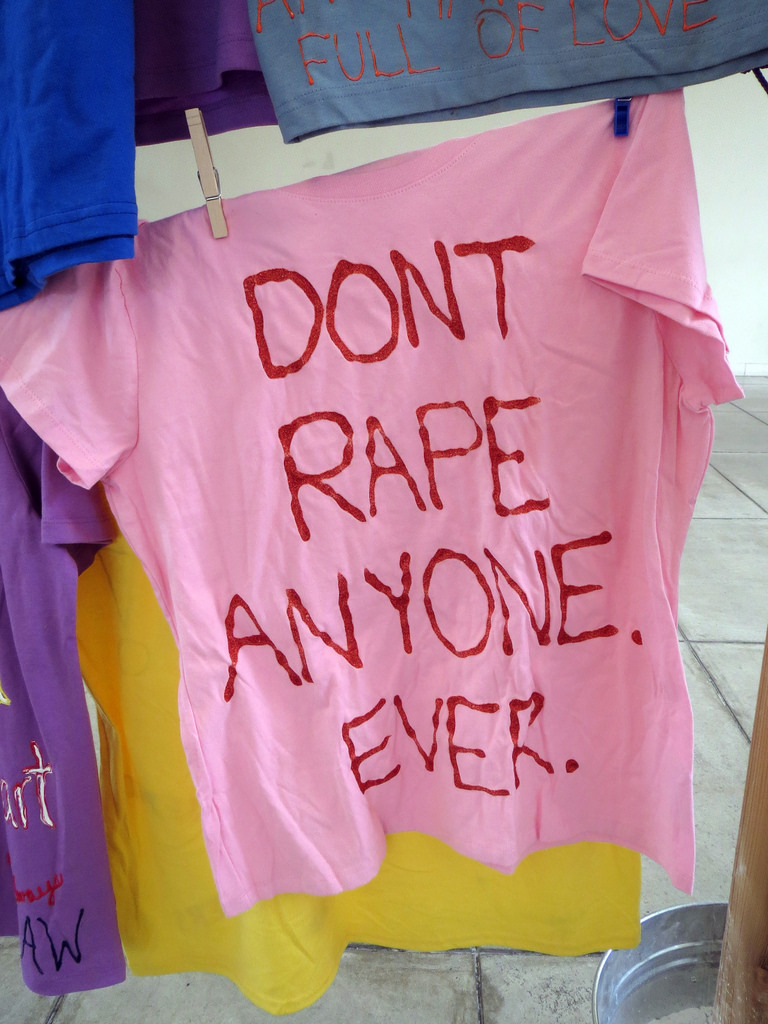“Five ways to eradicate rape culture”
October 14 Sexual violence has no place in a democratic society, argues Laila Johnson-Salami, 20, a Correspondent from Ibadan in Nigeria, who outlines five steps aimed at eradicating rape culture.
Sexual violence has no place in a democratic society, argues Laila Johnson-Salami, 20, a Correspondent from Ibadan in Nigeria, who outlines five steps aimed at eradicating rape culture.
Sexual violence has become an increasingly prevalent act in Nigeria over the years. There has been little implementation of effective policies that treat sexual violence as a serious crime, which has led to more and more perpetrators walking free. Recently, a story of a six-month old baby being raped by a teacher broke the internet. #JusticeForHajara trended as the Nigerian media announced that her alleged rapist was allowed to walk free on bail after arrest.
One should never be allowed to get away with such a serious crime in a democratic nation, and it raises several questions regarding law and order in Nigeria.
So how can we work towards eradicating Nigeria’s rape culture? I suggest five measures.
1.Pressurise the government
Nigeria’s 2013 Sexual Offences Bill highlights sexual violence related crimes and the punishments that should go unquestioned. However, the bill has not been that effective as rapists continue to be liberated for their actions every day across the country. Therefore, it is important that as citizens, we pressurise the government through safe protests, social media and letters to our senators, letting them know that enough is enough. Governments tend to take action once highly pressurised to do so in most democratic states, especially as the voice of the citizen can catch the attention of the media both nationally and internationally, which leaders would want to avoid as this breeds negative perceptions.
2.Educational intervention
Educating youths in particular and raising awareness about Nigeria’s rape culture is extremely important. From workshops to books to conferences, we need to ensure that the Nigerian population is informed and provided with risk-reduction procedures. Several courses are available including a free online course available to you with Purple Nigeria.
3.Self defence training
Being able to protect yourself in situations of vulnerability is extremely important. Taking it upon yourself to make sure that you can defend yourself physically to some extent is highly important in unsafe environments. Resistant strategies can stop the actions of a rapist whether forceful, non-forceful (such as the use of a rape alarm) or verbal.
4. Break the silence
Unfortunately, sexual violence is highly stigmatised in Nigeria, which leads several victims to remain silent. The victim is often blamed due to several unfortunate practices such as gender bias and misogyny. There is also the false perception that men cannot get raped, which leads several male victims to keep silent. But remaining silent will never help the situation – speaking up about your experience and informing the necessary authorities is a step in the right direction. Letting perpetrators walk free will only lead to more cases of rape and no justice for you or any other victim of sexual violence.
5.Counselling and psychosocial care
This goes hand in hand with breaking your silence. Taking it upon yourself to receive psychosocial care is often a scary experience for victims of sexual violence but it is a strong way to express your emotions and pick yourself up again. Sexual assault referral centres such as the Mirabel Centre are always open and willing to help you. You never have to go through your experience alone.
Several NGOs and CSOs across Nigeria such as Stand To End Rape and Our Vision NG continue to speak up against sexual violence, while educating citizens on the dangers and depth of the act. However, eradicating sexual violence requires more than the goodwill of citizens; it requires the actions of politics and governance and the sincerity of Nigeria’s leaders. We cannot give room to perpetrators to get away with such nasty crimes – we need to take action and put an end to rape.
Photo credit: benchilada DON’T RAPE ANYONE EVER shirt – Clothesline Project Shirts by the Rape Advocacy Counselling and Education Services Lincoln Square Village via photopin (license)
………………………………………………………………………………………………………………………………………………………………………
About me: I am the founder of two NGOs –We Rise Initiative and Our Vision NG, that empower African women and youth to rise above oppression to maximise national potential. My business, 21 Africa, helps brands improve their social media image. A journalist for Africa Rizing, I advocate for the current generation and inspire young people through strong stories about ‘what we need’ in Africa.
I am also an Ambassador for Girl Rising and a keen campaigner for sustainable development.
………………………………………………………………………………………………………………………………………………………………
Opinions expressed in this article are those of the author and do not necessarily represent the views of the Commonwealth Youth Programme. Articles are published in a spirit of dialogue, respect and understanding. If you disagree, why not submit a response?
To learn more about becoming a Commonwealth Correspondent please visit: http://www.yourcommonwealth.org/submit-articles/commonwealthcorrespondents/
…………………………………………………………………………………………………………………………………………………






